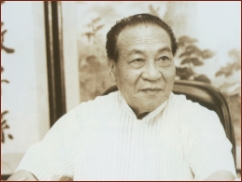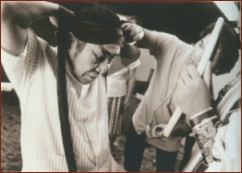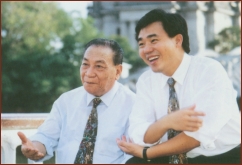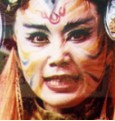|
|
 |
 The Founder of the Ming Hwa Yuan---Chen Ming-ji
The Founder of the Ming Hwa Yuan---Chen Ming-ji |
 From the description Mr. Chen Sheng-Fu
that gave us and the history of the Ming Hwa Yuan, we get
to know more about the founder of the Ming Hua Yuan-Chen
Ming-ji. After considerable discussion and revision, we include
the life of Mr. Chen Ming-ji and the process of how he founded
the Ming Hwa Yuan in this section.
From the description Mr. Chen Sheng-Fu
that gave us and the history of the Ming Hwa Yuan, we get
to know more about the founder of the Ming Hua Yuan-Chen
Ming-ji. After considerable discussion and revision, we include
the life of Mr. Chen Ming-ji and the process of how he founded
the Ming Hwa Yuan in this section.
Chen Ming Ji was born into a poor family in 1912. To help
relieve the financial situation of his family, he began to
work. He only received three years’ school education. At
that time, he used to sell cold drinks near the stage. Since
then, he was gradually fascinated by the Taiwanese Opera.
At the age of thirteen, he sneaked out of his home and joined
a Taiwanese Opera troupe. From then on, he had established
an eternal bond with Taiwanese opera.
From a utility man in the beginning, then a leading actor,
and eventually, a chief of one of the biggest Taiwanese Opera
troupes in Taiwan, Chen Ming-ji was confronted with countless
difficulties and frustration. No matter how harsh the situation
become, he was always determined to pass down Taiwanese opera
to the next generation. Thanks to his persistent determination,
the Ming Hwa Yuan was able to tide over the suppression of
Japanese colonization, the indifferent attitude of the KMT
government, and the advent of televisions to become the top-notch
Taiwanese opera group in Taiwan.
|
 The Foundation of the Ming Hwa Yuan
The Foundation of the Ming Hwa Yuan |
 Chen
Ming-ii joined New Colored Clouds troupe when he was thirteen
and switched to He-Sheng troupe in the same year. Being nicknamed
as ‘’ Big Silly Goose,’’ he played different roles such as
a utility man and all kinds of supporting characters. However,
it was until one time that the opportunity came across him.
It all happened so suddenly when the popular young male lead
of the drama Dan Guei Painting left without telling anybody.
Seeing the opera might not be performed as scheduled, Chen
Ming-ji was recommended to substitute for the male lead. This
officially launched his unusual lifetime career. The chief
of He-Sheng troupe passed away when Chen was eighteen. Later
on, his fellow troupers and he together formed the Jin He
Shing troupe. Young Mr. Chen was appointed as the chief of
the troupe. AS time went by, Jin He Shing troupe was dismissed
by Japanese government. The next year, Chen founded Ming Shen
Opera Troupe. A theater owner, Mr. Tsai Bing-hua own partnership
of the troupe with Chen. Mr. Tsai wished Chen could include
his name in the name of their troupe. Therefore, Chen renamed
the opera troupe as Ming Hwa Opera Troupe, which was later
known as the Ming Hwa Yuan Theater Troupe. Chen
Ming-ii joined New Colored Clouds troupe when he was thirteen
and switched to He-Sheng troupe in the same year. Being nicknamed
as ‘’ Big Silly Goose,’’ he played different roles such as
a utility man and all kinds of supporting characters. However,
it was until one time that the opportunity came across him.
It all happened so suddenly when the popular young male lead
of the drama Dan Guei Painting left without telling anybody.
Seeing the opera might not be performed as scheduled, Chen
Ming-ji was recommended to substitute for the male lead. This
officially launched his unusual lifetime career. The chief
of He-Sheng troupe passed away when Chen was eighteen. Later
on, his fellow troupers and he together formed the Jin He
Shing troupe. Young Mr. Chen was appointed as the chief of
the troupe. AS time went by, Jin He Shing troupe was dismissed
by Japanese government. The next year, Chen founded Ming Shen
Opera Troupe. A theater owner, Mr. Tsai Bing-hua own partnership
of the troupe with Chen. Mr. Tsai wished Chen could include
his name in the name of their troupe. Therefore, Chen renamed
the opera troupe as Ming Hwa Opera Troupe, which was later
known as the Ming Hwa Yuan Theater Troupe.
After Taiwan’s restoration, the Ming Hwa Theater Troupe could
finally take a great stride toward the new era. Chen added
another Chinese character, “Yuan(meaning garden in Chinese)”
in the end of the troupe’s original name, to symbolize future
prosperity of his troupe. Thus, the Ming Hwa Yuan Theater
Troupe was born.
|
 Chen Ming-ji’s Mottos
Chen Ming-ji’s Mottos
|
The
Ming Hwa Yuan was no different from other Taiwanese Opera
troupes. They all experienced the ups and downs of Taiwanese
Opera. Sad to say, the Ming Hwa Opera Troupe was suppressed
and persecuted during Japanese Occupation Period. Especially
after the July Seventh Lugouqiao Incident in 1937, Japanese
government began to implement Kominka Movement(assimilation
policy). Taiwanese Opera troupes were dismissed. If not,
they had to present new operas, or better ones. However, Chen
never gave up. He devoted more time to the opera group in
the hope of make Taiwanese Opera thrive some day in the future.
He dedicated himself to performing Taiwanese Opera as well
as fulfilling the morals from the drama throughout his life.
The morals not only cultivated his personality, but also could
be used to educate the younger generations.
Chen kept reminding his troupers to not only deliver the morals
in the drama, but also bear them in mind. The Ming Hwa Yuan
need not preach audiences with disciplines, nor bombard audiences
with slogans, because morals are already internalized in their
drama and their personality. That’s the genuine spirit of
Taiwanese Opera. Chen’s mottos reached down to everyone’s
heart. Because of Chen’s enthusiasm and determinations, the
Ming Hwa Yuan was able to survive through the difficult times,
ushering in the heydays of Taiwanese Opera during the 1940s
and 1950s.
|
 Passing Down to The Third Son-Chen Sheng-fu
Passing Down to The Third Son-Chen Sheng-fu
|
 In
1979, Chen passed down the torch of the Ming Hwa Yuan to his
third son-Chen Sheng-fu-the only one in the clan who doesn’t
learn Taiwanese Opera. It was because Chen Sheng-fu had been
away from home working for a long time, which made Chen Sheng-fu
capable of objectively providing the most up-to-date information
to the Ming Hwa Yuan. His father believed that Chen Sheng-fu
would be the person to pave a more promising path for the
future. In
1979, Chen passed down the torch of the Ming Hwa Yuan to his
third son-Chen Sheng-fu-the only one in the clan who doesn’t
learn Taiwanese Opera. It was because Chen Sheng-fu had been
away from home working for a long time, which made Chen Sheng-fu
capable of objectively providing the most up-to-date information
to the Ming Hwa Yuan. His father believed that Chen Sheng-fu
would be the person to pave a more promising path for the
future.
Indeed, Chen Sheng-fu did not let his family down. In 1982,
the Ming Hwa Yuan released the drama, Father & Son, which
depicts an exotic romance and how an illegitimate son reunites
with his father. This drama poignantly pointed out the contradiction
and complexity between morals and human nature. Unlike other
obsolete plots of Taiwanese Opera, this drama won championship
of National Local Drama Contest, Best Group Acting Award,
Best Director Award, and Best Male Lead Award. Since then,
the Ming Hwa Yuan became a household name and was granted
to perform in National Culture and Arts Festival.
|
 Chen Ming-ji’s Contributions & Achievements
Chen Ming-ji’s Contributions & Achievements
|
From
traditional Chinese perspective, it may be normal for Mr.
Chen Ming-ji to pass down the troupe to his own son, Chen
Sheng-fu.. While in the 21st century, it is almost impossible
to find a family who can sustain its family business for more
than three generations, not to mention a family who run a
Taiwanese Opera troupe that more than seventy members of it
all wholeheartedly dedicate themselves into this business.
The Ming Hwa Yuan’s contributions have changed people’s
perspectives about Taiwanese Opera. New consensus has been
reached between performers and audiences. Experts begin to
notice this amazing traditional theatric form.
The Ming Hwa Yuan has gone through the difficult beginning
phase under Japanese colonization, and started to robust with
Taiwan’s boosting economy, while facing the challenges of
other new types of entertainment and media, it is still there
with us. Now with modern business management, the Ming Hwa
Yuan is fully prepared to conquer the world with its fantastic
performance. In 1993, Mr. Chen Ming-ji won the Life Achievement
Award of Art honored by American Chinese Arts Association
in New York. In 1996, Chen Ming-ji won Life Achievement Award
of Art presented by Chinese Culture and Arts Association.
Mr. Chen Ming-ji passed away in 1997 at eighty-six years of
age. Looking back on his legendary career, we cannot help
but salute him from the bottom of our hearts.
|
|



